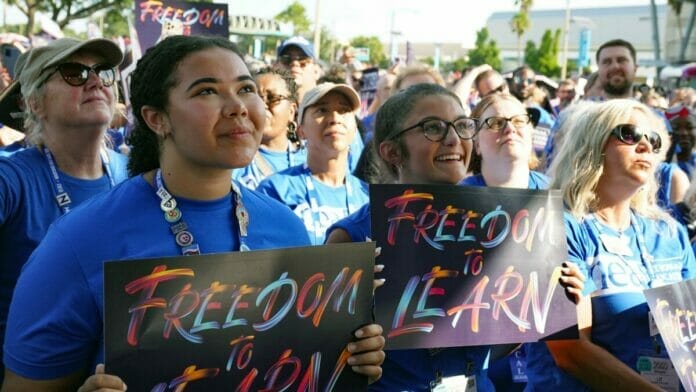
Florida’s new history standards say that African Americans benefited from slavery. Florida educators, including social studies teacher Jorje Botello, are furious about it.
By: Brenda Álvarez, Senior Writer, National Education Association
KEY TAKEAWAYS
- Florida’s new standards for how African American history should be taught have drawn severe criticism across the country, especially in The Sunshine State.
- These new standards require middle school students to be taught that the experience of slavery was beneficial to African Americans because it helped them acquire skills—a setback for students
Officials from the Florida State Board of Education recently released a new history standard that has caused an uproar in the education community. The standard includes controversial language that claims, “slaves developed skills which, in some instances, could be applied for their personal benefit.”
This standard comes a year after Gov. Ron DeSantis signed into law the Stop Woke Act and confirms many of the worst fears educators had when the law passed, according to the Florida Education Association (FEA), which blasted it as a big step backward.
“How can our students ever be equipped for the future if they don’t have a full, honest picture of where we’ve come from? Florida’s students deserve a world-class education that equips them to be successful adults who can help heal our nation’s divisions rather than deepen them,” said FEA President Andrew Spar, in a press statement. “Gov. DeSantis is pursuing a political agenda guaranteed to set good people against one another, and in the process, he’s cheating our kids. They deserve the full truth of American history, the good and the bad.”

For Jorje Botello, an American history teacher for more than 20 years, in Okeechobee, Fla., he loves it when his students can make connections between the past and present—along with the critical thinking that goes with it to better understand our nation’s history to help improve the future. But Florida’s new history standard is a setback to that great teaching and learning. In a recent interview with NEA Today, Botello explains why.
What was your initial reaction when you read that the Florida standards teach that slavery benefited African Americans?
I was furious, and I was disappointed given that every step we’ve taken as a country to embrace diversity and to show people it’s not about the color of our skin but about us, as a people, moving forward. This is going to set us back so much as classroom teachers who will be forced to teach it this way. It’s a big blow to our students and nation.
What’s the potential impact on students?
I had thought about this for a while, even before all this started to happen and was put into law. Students, especially now with all information that’s readily available, if they don’t do their own research and only believe the first thing they hear or see, it’s going to leave them very gullible and confused. And for concrete knowledge to be twisted in this way—just because someone decided to put an agenda forward of rewriting history—is going to set us back quite a bit. Like, to say that slavery benefited certain people? That’s ridiculous.
What’s the danger in that?
I know a lot of people don’t like the parallels between what’s going on in Florida and … fascism, …but it’s very similar. As a historian, I can tell you it’s like what we saw in Nazi Germany in the 1930s.
They started with a re-education and with attacking certain groups. People sometimes say, ‘Well, this isn’t Nazi Germany,’ but what’s happening now is very similar. It also proves that we are not learning from our history. If we were, we wouldn’t be repeating the same mistakes. It’s not a small mistake, either, that we can get over quickly. This is going to have a ripple effect even if it’s implemented for just a few years or even one year. In general, this is going to cause a problem.
I’ve had this conversation with numerous colleagues … and the conversation keeps coming back to how we have an education system in which public schools are held so accountable to state standards and to these tests, but only for certain things.
Great value is placed on math, language arts, and science, for example, but when it comes to knowing the history of our country, that can get a little gray. This tends to depend on where you got an education, and what was left in place, and what was omitted from that history.
I firmly believe that not having a real understanding and a uniform understanding of our history … has allowed for us to not embrace what America is. I think this is going to add to that further division.
Officials from the Florida education department describe this standard as comprehensive and rigorous. How would you describe it?
I would not describe it like that at all, especially since they didn’t even confer with public school teachers and the Florida Education Association that could say, ‘This isn’t good.’
If they would have reached out to public school teachers, they would have learned right away that this was going to do more harm than good. But again, this feels like it was driven by a political agenda more than anything else.
What does this mean for you as a middle school teacher?
As a teacher, I will still teach. I teach civics and, in my class, we learn about different amendments that were passed in these landmark court cases. Of course, one of them being the 13th Amendment, which abolished slavery—that’s the short version. From this, I have to explain slavery. And I, in good conscience, cannot say or think it’s ethically correct to say ‘Well, you know, African Americans did benefit from slavery.’
As a person who studied African American history and has taught the African American experience in high school earlier in my career, I know they didn’t benefit from slavery. This standard is trying to make a positive out of a negative by saying enslaved people benefited from all this work. No. The real story is that people were brought over by force because of their skill sets.
Plantation owners looked for people who could plant tobacco or grow rice. They looked for people who were more educated and skilled than the people already living here—whether they were early Europeans or indentured servants. These were people that had special skills but were kidnapped and harvested from their areas. And so, to claim that ‘they learned it while here,’ … No. People knew exactly what they were doing when it came to slavery.
What evidence did officials from the Florida education department have to write the standard in such a way?
I don’t believe they had any evidence. If I can be so bold to say that I and many other Florida educators went to lobby our legislators. We met face to face and told them how bad these bills are. But they’re entrenched in where they are politically and how they’re going to vote. They met with us because it’s part of the dog and pony show they put on.
It didn’t seem right for them to put on this show of them listening to us. They have an idea as to what they want to push out. They push it out, and then that’s it. That’s the end of the story.
And it’s sad. Especially because there’s going to be a small population of kids who grow up to believe this made-up story of ‘well, it benefited people.’ I don’t feel the state of Florida is too far away from saying, ‘You know, the Holocaust may have happened, but the victims got some good out of it too.’
SOURCE: NEA Today



We agree that deliberate misinformation and lies should never be tolerated, and we actually agree that an opposing point of view should have been included in Ms. Alvarez’s article. That being said, apart from not interviewing someone such as you, we do not see the gross misrepresentation you suggest. If you’d like to publish a commentary with your opposing point of view, kindly submit it. We think people with different ideological beliefs should able to disagree and at the same time defend their opponents’ right to be heard.
Brenda Álvarez is a Senior Writer for the National Education Association. We believe in the free flow of information. if you would like to be interviewed in connection with this matter, we can arrange it for a story currently being prepared by a writer for this newspaper. IF you’d like to provide a countervailing position for this article, write it up and we will pass it along to Ms. Alvarez.
Please tell us in what way the story misrepresents the new guidelines. Tell us also what specific skills the slaves learned during slavery that “benefitted their careers once freed.” Actual events only please. Maybe you can also layout for us one of these “careers” freed blacks enjoyed post-slavery.
I realize this is an article written by a writer from the NEA and expected it to be biased against any educational reforms that don’t tow their ideological line. The fact that writer only “interviewed” one source, a history teacher, further indicates this is not journalism but a propaganda piece promulgated by the NEA. For a serious “news” article, the journalist/author as well as editor would include perspectives from both sides of the argument as well as cite sources such as actual phrases used in the new standards.
The writer seems to just be a stenographer writing verbatim the words of the interviewee without questioning any of the comments the teacher made.
This type of “reporting” should not be considered a legitimate news article to published and foisted onto the public as objective reporting. Perhaps if readers insistently and loudly complain enough the occupation of journalism might be pushed to regain some credibility.
This is a GROSS MISREPRESENTATION of the new education guidelines and the fact that you are spreading DISINFORMATION is apalling. It is PROVEN that the skills slaves learned while being slaves, benefited their future careers once freed. Teaching ACTUAL EVENTS is what education should be about, not PANDERING to people who were never slaves, or DEMORALIZING people who NEVER owned slaves. You should be ASHAMED of yourself, writing this garbage and stating it’s “journalism”.
Comments are closed.